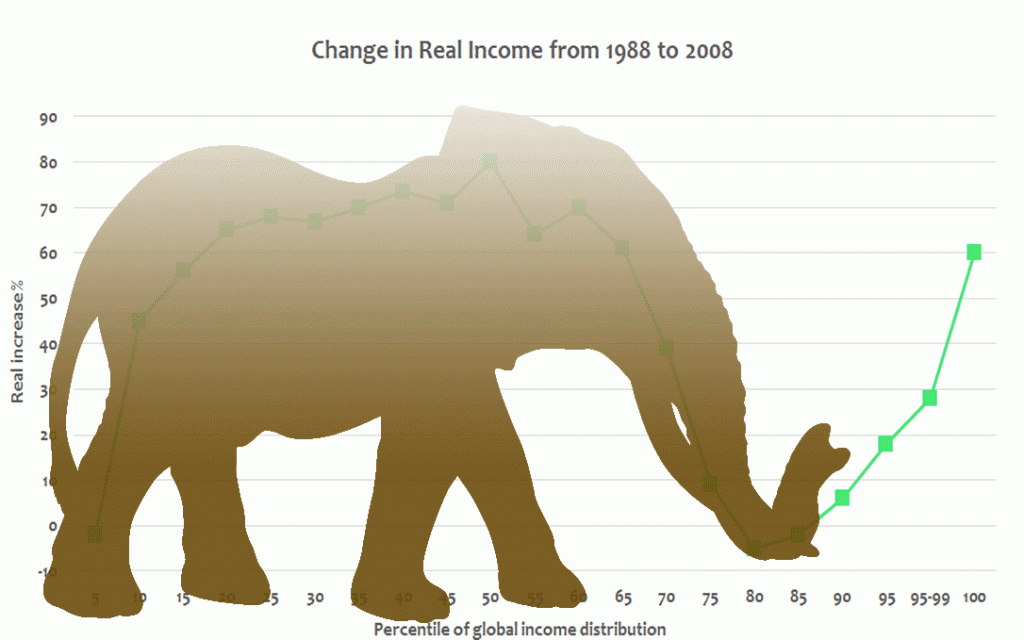by James Watkins, Dec. 19, 2016, http://www.ozy.com/provocateurs/the-man-behind-the-most-important-chart-of-2016/74283
Because he can explain the appeal of Trump, Bernie, Brexit and all the rest of it in one chart.
You may know the name Thomas Piketty. His work launched him to prime time as the “rock star economist”; his sultry French accent and general attractiveness, of course, helped. You may not know the name of his intellectual counterpart: Branko Milanović. Balding and bespectacled, the 63-year-old looks much more like a dismal scientist than a revolutionary.
Nonetheless, Milanović is an heir to the great social scientists of yore — Smith, Marx, Keynes and Hayek — and part of a merry band of economists, Piketty included, who are rescuing their profession from popular irrelevance. His contribution? A single chart that describes 30 years of world economic history. Some have called it “the most important chart in economics.” But it has an even catchier nickname: “The Elephant Curve.”
The chart — yes, it’s pachydermically shaped — lines up all of humanity according to their incomes (at least between 1988 and 2008). The good news: Everyone has gotten richer. The less good news: Some have gotten richer much, much faster than others. They’re the ones on the elephant’s trunk. Those just below them, in the 80th and 90th percentiles of income, have fallen way behind on growth. According to Milanović and his co-author, Cristoph Lakner, this is largely working- and middle-class Americans and Europeans.

The chart does not assign causation, but it’s easy to point the finger at the, er, elephant in the room: globalization. It’s “a plausible narrative,” says Milanović. “The gains from such big forces like globalization are never going to be equal for everybody.” Over the past year, the chart has gotten much traction, with some arguing it explains the rise of Bernie, Trump, Brexit and all the rest of it. China has boomed, while in rich countries, the rise of the megawealthy has rubbed salt into middle-class wounds. Bernie might argue that cutting off the trunk (taxing the rich) could solve the problem, whereas Mr. Trump suggests that protectionism could push down the animal’s back.
Elephants aside, Milanović’s data work has enabled new insights into the nuts and bolts of how global capitalism works: He has overturned decades of economic orthodoxy to show that inequality in fact rises and falls in waves as countries develop. He also shows that inequality within countries is now becoming more significant than inequality between countries for describing the state of the global rich and poor. This is at the heart of the populist uprisings of 2016, he says: “Our incomes are increasingly determined globally, but our political space is national.”
When we meet in his generic office at the City University of New York’s Graduate Center, so immaculately tidy as to appear uninhabited, Milanović explains his complex theory to me at a hundred miles an hour, with a level of articulacy that would be remarkable even for a native English speaker. He was born in Paris to Serbian parents, and a stint in Spain added to the eclectic array of languages he speaks and soccer teams he follows (he also speaks Russian, and reads books about Russian history in his spare time). Milanović is an old-school intellectual to the core, convinced that his study of philosophy, classical literature and world history informs his craft almost as much as his prolific Twitter presence. And yet he manages to commit the ideas in his brain to paper so even we mere mortals can understand them: Practicing his craft on his popular blog, his book ran to fewer than half the pages of Monsieur Piketty’s 700-page tome, and was finished “in a blink,” says colleague Janet Gornick, director of the Stone Center on Socio-Economic Inequality.
Of course, that was once the idea was ready in his head; gathering the data for the elegant elephant took much of Milanovic’s career. To do this, he fought a lifelong data battle to compile a comprehensive global income distribution, starting out by wrangling access to locked-away Yugoslavian numbers through a friend in the statistical office back in the ’80s, and continuing by exhaustively begging and borrowing (but never quite stealing) household survey data from pretty much every country in the world. This data collection effort, and the ability to smoosh it all together, has been “heroic,” says Gornick.
HE COULD DO VERY CONVENTIONAL WORK IF HE WANTED TO, BUT HIS BRAIN DOESN’T TAKE HIM THERE.
JANET GORNICK
To be sure, not all agree that the elephant curve is quite as earth-shattering as it has been made out to be. There is no evidence that globalization alone depresses the incomes of middle-class workers in rich countries, says Caroline Freund, senior fellow at the Peterson Institute for International Economics. She also argues that certain key countries (such as China and Japan) distort the global averages to make the curve more elephant-y than it should be. But that’s beside the point, rebuts Milanović: The fact remains that incomes have grown more slowly in countries such as the U.S., Germany and France than they have in many Asian countries.
Milanović doesn’t talk too much about potential solutions in his book, which he now thinks was a “mistake,” because the current wave of inequality will at some point come to an end. The winds of globalization and technology could shift, he says, perhaps targeting more highly skilled sectors (think outsourcing coding jobs to Africa, or the rise of robot surgeons). And policies can help too, but not the tired “20th century” policies of taxing the rich and spending on benefits. Instead, Milanović is typically creative and intellectually ambidextrous: Improving the quality of public education, he says, citing Sanders, and creating incentives for the middle classes to financially invest, a la Margaret Thatcher. Now those are two names that only he could cite in the same sentence and still sound smart.